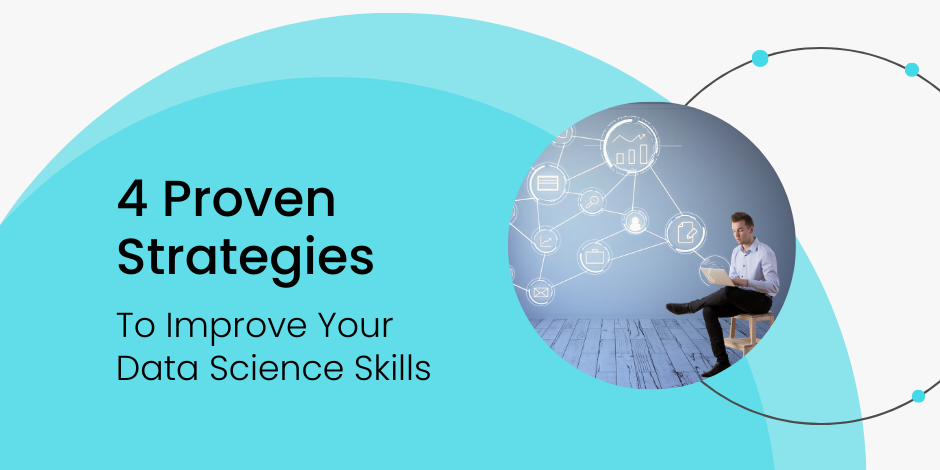4 Proven Strategies to Improve Your Data Science Skills

Stay Informed With Our Weekly Newsletter
Receive crucial updates on the ever-evolving landscape of technology and innovation.
In today’s data-driven world, possessing strong data science skills is becoming increasingly crucial. Whether you are a seasoned data scientist or someone looking to break into this exciting field, honing your data science skills should be a top priority.
By improving your expertise in various areas such as statistics, programming languages, machine learning, and deep learning, you can enhance your data science proficiency and take your career to new heights. Here we explore four proven strategies that will help you improve your data science skills.
Understanding the importance of data science skills

Before we delve into the strategies, it’s essential to grasp why data science skills are in such high demand. In today’s data-driven world, organisations are collecting vast amounts of data. However, raw data is of little value without the ability to extract insights and make informed decisions.
Data science skills enable individuals to analyse and interpret complex data sets, uncover patterns, make accurate predictions, and drive meaningful business outcomes. Whether you are working in finance, healthcare, marketing, or any other industry, having strong data science skills can give you a competitive edge.
The role of data science in today’s world
Data science plays a pivotal role in transforming raw data into actionable insights. It involves the use of various techniques, algorithms, and statistical models to extract meaningful information from structured and unstructured data.
From predictive analytics to natural language processing and computer vision, data science methods and tools are revolutionising industries across the globe. By understanding the role of data science, you can appreciate the impact it has on driving innovation and solving complex problems.
Why you need to improve your data science skills
Improving your data science skills can offer numerous benefits, both professionally and personally. From a career perspective, having strong data science skills opens up a wide range of opportunities.
Data scientists are in high demand, and organisations are willing to pay top dollar for individuals who can leverage data to drive business success. Additionally, data science skills can empower you to solve real-world problems, make data-driven decisions, and contribute to the advancement of your chosen field.
Whether you are in academia, industry, or entrepreneurship, honing your data science skills can have a transformative impact on your career trajectory.
Strategy 1: Enhancing your statistical knowledge

Statistics form the foundation of data science. A solid understanding of statistical concepts is crucial for analysing data, drawing meaningful conclusions, and making accurate predictions.
To enhance your statistical knowledge, start by familiarising yourself with the fundamentals, such as probability distributions, hypothesis testing, and regression analysis.
Online courses, including those on offer at the Institute of Data, textbooks, and resources from reputable institutions are excellent starting points.
You can also consider applying your statistical knowledge to real-world data sets. By conducting analyses and drawing insights, you can gain hands-on experience and consolidate your understanding.
Importance of statistics in data science
Statistics in data science provides the necessary tools and techniques to analyse data and draw meaningful conclusions. From exploratory analysis to hypothesis testing and model building, statistics enables data scientists to uncover patterns, identify relationships, and make informed predictions.
By mastering statistical concepts, data scientists can confidently analyse and interpret complex data sets, enabling them to extract valuable insights and drive data-driven decision-making within organisations.
Resources for learning statistics
When it comes to learning statistics, the resources available are plentiful. Online courses, textbooks, and video tutorials can help you grasp statistical concepts and apply them in a practical setting.
Statistical software tools such as R and Python provide extensive documentation and tutorials for data scientists looking to enhance their statistical knowledge. Don’t forget to actively engage with the data science community, participating in forums and attending meetups can further enrich your learning journey.
Strategy 2: Mastering programming languages

Programming languages are essential tools for data scientists. They enable you to manipulate data, build models, and visualise results.
Python and R are two of the most widely used programming languages in data science. Python, with its simplicity and vast ecosystem of libraries, is an excellent language for data manipulation and analysis.
On the other hand, R’s extensive statistical capabilities make it a popular choice among statisticians and data scientists. Mastering these programming languages will broaden your data science skills and open up new avenues for solving complex data problems.
Tips for learning programming languages
Learning a programming language takes time and dedication. Here are a few tips to help you get started on your journey to mastering Python and R:
- Start with the basics: Familiarise yourself with the syntax, data structures, and control flow of the language.
- Apply your skills: Practise programming by solving real-world data problems. Kaggle competitions and data science projects are excellent platforms to apply your knowledge.
- Collaborate with others: Join online communities and collaborate with fellow data scientists. Code reviews, discussions, and pair programming can provide valuable learning experiences.
- Explore libraries and packages: Python and R have extensive libraries that can significantly simplify your data science workflow. Take the time to explore and master popular libraries like Pandas, NumPy, ggplot2, and dplyr.
Strategy 3: Getting hands-on with machine learning
Machine learning is revolutionising industries by enabling computers to learn from data without explicit programming instructions. From image recognition to recommendation systems, machine learning algorithms are powering a wide range of applications.
Getting hands-on with machine learning is a great way to improve your data science skills and strengthen your understanding of key concepts and techniques.
Understanding the basics of machine learning
Machine learning involves training computers to learn from data and make predictions or decisions without explicit programming. It encompasses various algorithms, such as linear regression, support vector machines, and random forests.
To understand the basics of machine learning, start with concepts like supervised and unsupervised learning, data preprocessing, model evaluation, and model selection. Online courses, tutorials, and practical exercises can help you gain a solid foundation in machine learning.
Practical machine learning projects to try
To apply your knowledge and gain practical experience in machine learning, consider taking on real-world projects. Start with simple projects like predicting house prices or classifying images.
As you gain confidence, you can work on more complex projects that align with your interests. By completing these projects, you will not only improve your data science skills but also build an impressive portfolio to showcase to potential employers.
Strategy 4: Diving into deep learning
Deep learning is a subfield of machine learning that focuses on algorithms inspired by the structure and function of the human brain. It has revolutionised fields such as computer vision, natural language processing, and speech recognition.
Diving into deep learning will enable you to tackle complex problems and enhance your data science skills.
The difference between machine learning and deep learning

While machine learning algorithms require explicit feature engineering, deep learning algorithms learn representations directly from the data. Deep learning models, such as neural networks, consist of multiple layers of interconnected nodes, mimicking the structure of the human brain.
This enables deep learning models to automatically learn complex patterns and relationships in the data, making them particularly effective for tasks such as image and speech recognition.
Getting started with deep learning
Deep learning can be intimidating due to its complexity and computational requirements. However, with the right approach, you can jumpstart your deep learning journey.
Start by understanding the basics of neural networks, activation functions, and backpropagation. Online courses and tutorials can provide a solid foundation. Additionally, frameworks like TensorFlow and PyTorch offer comprehensive documentation and tutorials, making it easier to get started with deep learning.
As you gain experience, experiment with different architectures and techniques, and stay up to date with the latest research in the field.
Conclusion
Improving your data science skills is a continuous process that requires dedication and practice. By implementing the strategies outlined in this article, you can enhance your statistical knowledge, master programming languages, and gain hands-on experience in machine learning and deep learning.
Remember, learning data science is a journey, and each step you take brings you closer to becoming a proficient data scientist. So, embrace the challenge, stay curious, and never stop learning.
With perseverance and a passion for data, you can unlock your full potential and excel in the exciting world of data science.
Are you ready to take your data science skills to the next level? The short courses on offer at the Institute of Data will guide you through the proven strategies discussed in this article, helping you build a strong foundation in statistics, master essential programming languages like Python and R, and dive deep into the exciting world of machine learning and deep learning.
We also offer free career consultations with our local team if you’d like to discuss your options.

